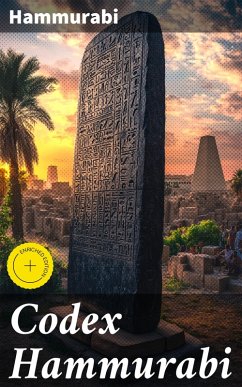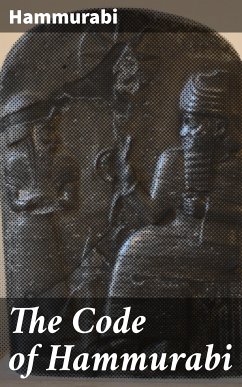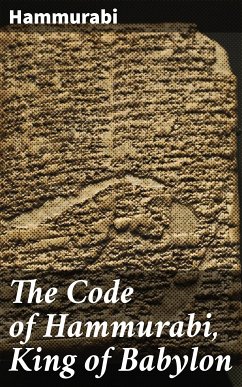
Codex Hammurabi (eBook, ePUB)

PAYBACK Punkte
0 °P sammeln!
The Codex Hammurabi is a monumental work that stands as one of the earliest examples of written law in human history, encapsulating an extensive compilation of legal principles from ancient Mesopotamia. Written in Akkadian, this stone stele epitomizes the stylistic grandeur of Babylonian literature, employing a formal structure that codifies over 280 laws encompassing various aspects of daily life, commerce, and justice. The text reveals the socio-political landscape of 18th century BCE Babylon, offering insights into the values and norms that governed society, while its proclamations illustra...
The Codex Hammurabi is a monumental work that stands as one of the earliest examples of written law in human history, encapsulating an extensive compilation of legal principles from ancient Mesopotamia. Written in Akkadian, this stone stele epitomizes the stylistic grandeur of Babylonian literature, employing a formal structure that codifies over 280 laws encompassing various aspects of daily life, commerce, and justice. The text reveals the socio-political landscape of 18th century BCE Babylon, offering insights into the values and norms that governed society, while its proclamations illustrate the king's role as a god-given authority upholding order and fairness in his realm. Hammurabi, the sixth king of the First Babylonian Dynasty, has been immortalized for his pioneering contributions to law and governance, which likely stemmed from his desire to unify a diverse population under a coherent legal framework. His leadership during a time marked by conflict and migration reflects a profound understanding of the social fabric, motivating his enactment of these laws, which sought to establish equity and deter injustice. The Codex serves not only as a legal document but also as a testament to Hammurabi's vision of civil order. This essential text is highly recommended for anyone interested in legal history, ancient cultures, or the evolution of governance. Its thorough exploration of law, morality, and social contract remains relevant today, inviting readers to reflect on the foundations of justice and societal structure. Engaging with the Codex Hammurabi provides invaluable context for contemporary legal systems and the enduring quest for equitable governance.
Dieser Download kann aus rechtlichen Gründen nur mit Rechnungsadresse in A, B, BG, CY, CZ, D, DK, EW, E, FIN, F, GR, H, IRL, I, LT, L, LR, M, NL, PL, P, R, S, SLO, SK ausgeliefert werden.













